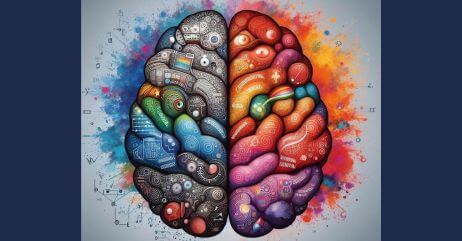Last updated on July 14th, 2024 at 04:38 pm
While it may seem like a useful skill, multitasking also has some dark sides. Here are 10 reasons why multitasking is bad for your brain.
Studies have shown that multitasking skills can decrease productivity and impair cognitive functions such as memory and attention.
When you attempt to multitask, your brain has to switch between different tasks, which can lead to “cognitive overload,” resulting in decreased performance and increased stress levels.
The brain can only truly focus on one task at a time, and trying to divide attention between multiple tasks can result in reduced accuracy and quality of work.
Also, handling multiple tasks at a time can hurt long-term memory. Your brain stores information in your hippocampus, but when you divide your attention, your memories become fragmented and disconnected, making them difficult to recall later.
Therefore, it is better to focus on one task at a time and give it our full attention, rather than trying to juggle multiple tasks simultaneously.
Table of Contents
- The Brain Split into Halves by Multitasking
- How Multitasking Damages the Brain
- Prolonged Media-multitasking Linked to Smaller Gray Matter Density
- 10 Reasons Why Multitasking is Bad for Your Brain
- Frequently Asked Questions
- Final Thoughts
The Brain Split into Halves by Multitasking

The prefrontal cortex part of the brain springs to action when you need to pay attention or focus.
This area is made of the right and left sides and is the brain’s motivational area that helps it process and carry out tasks.
When focused on a single task, both sides work together to deliver quality concentration which equates to quality tasks without errors and confusion.
But when tasks are combined, the right and left parts of the brain handle the tasks independently of each other, causing disorganization and confusion, and this is why multitasking is bad for your brain.
This is why it is said that one cannot be a master of all trades and one cannot serve two masters at a time.
There must be impartiality that might result in conflicts that would render everything useless at the same time.
Related: 10 Multitasking Skills
How Multitasking Damages the Brain
Before now, it was believed that cognitive issues that pointed to juggling tasks were temporary and would be repaired when the individual stopped combining tasks. However, researchers are saying otherwise.
Sussex University researchers compared the amount of time spent by people on different devices at once such as texting and watching TV to MRI scans of their brains.
It was found that people who combine tasks a lot showed less brain mass in the anterior cingulate cortex which is the region that is responsible for empathy and cognitive control, including emotions.
Though further research is needed for clarity on whether multitasking skills can cause physical brain damage or if it is existing brain damage that enhances people’s multitasking, certainly, combining tasks is not your good friend.
According to a neuroscientist, Kep Kee Loh, the head of the study,
“It is important to create awareness that our interaction with devices might be changing how we think and the changes might be happening at the level of brain structure.”
Related: Multitasking in Teenagers and How to Find Balance
Prolonged Media-multitasking Linked to Smaller Gray Matter Density

Media-multitasking is the concurrent consumption of multiple media forms which has been on the rise since the advent of especially smartphones.
It has become prevalent in the society of today and is linked to negative psychological and cognitive problems.
People who engage in heavy media multitasking perform very poorly on cognitive tasks and at the same time show poor social intelligence and exhibit more socio-emotional difficulties.
The neural processes linked with media-multitasking are yet unexplored, but the present study reveals a clear relationship between repeated media-multitasking activities and brain structure alteration.
A study that tested about a million people found that 90% of senior performers have high EQs.
If multitasking damages the brain part called the anterior cingulate cortex which is a key brain region, then it lowers the IQ in the process.
The multitasking activity is managed in the brain by the mental executive functions which control and process other cognitive activities.
It determines when and how certain tasks are carried out.
It passes through two processes – goal shifting which is a decision of preferring one thing against another.
The second process – role activation – is changing from the rules of the first task to the rules of the second.
Switching may happen in a few seconds and so does not incur much time loss immediately, but when it is done repeatedly, it becomes a concern.
This could not be a big problem in little tasks like watching television while eating, but it would be a danger while driving.
10 Reasons Why Multitasking is Bad for Your Brain

1. Multitasking Reduces Cognitive Performance
The first reason why multitasking is bad for your brain is because it reduces cognitive performance.
Contrary to popular belief, while multitasking might seem to enhance productivity, it is counterproductive.
Studies have shown that switching between tasks can lead to a significant reduction in overall cognitive performance.
The brain expends energy and time when transitioning from one task to another, resulting in decreased efficiency and a higher likelihood of errors.
2. Impaired Focus and Attention
The second reason why multitasking is bad for your brain is because it divides your attention, making it challenging to concentrate on any single task effectively.
Continuous distractions hinder your brain’s ability to focus, impacting your capacity to retain information and solve problems.
Consequently, this leads to a decrease in overall work quality.
3. Increased Stress Levels
Engaging in multiple tasks simultaneously can trigger stress responses in the brain.
Constantly shifting attention from one task to another elevates cortisol levels, leading to heightened stress and potential long-term adverse effects on mental health.
4. Decreased Memory Retention
Another reason why multitasking is bad for your brain is because the brain’s ability to encode and retrieve information suffers when multitasking.
Information processed amidst distractions is less likely to be stored in long-term memory, affecting your ability to recall and apply knowledge.
5. Reduced Efficiency and Productivity
Despite the belief that multitasking enhances productivity, studies consistently demonstrate the opposite.
Juggling tasks leads to inefficiency, as the brain struggles to manage numerous tasks simultaneously, resulting in longer completion times and lower-quality output.
6. Impaired Decision Making
Handling multiple tasks at a time impairs your brain’s ability to make sound decisions.
Cognitive overload from managing multiple tasks simultaneously diminishes your capacity for rational and thoughtful decision-making.
7. Negative Impact on Relationships
Juggling tasks doesn’t just affect work; it can harm personal relationships.
Constantly dividing attention between tasks and devices during interactions can lead to misunderstandings, decreased empathy, and reduced quality of communication.
8. Increased Risk of Errors and Accidents
When the brain is split between tasks, the likelihood of errors and accidents rises significantly.
This is particularly critical in professions where precision and attention to detail are crucial, such as healthcare, engineering, and transportation.
9. Deterioration of Brain Structure
Prolonged exposure to simultaneous tasking can result in changes to brain structure.
Research suggests that chronic multitasking may lead to a reduction in gray matter density in the brain regions responsible for cognitive control and emotional regulation.
10. Inability to Achieve Flow State
The state of ‘flow,’ characterized by deep immersion and peak performance, becomes unattainable in a multitasking environment.
Flow state requires sustained focus, which is disrupted by the constant switching of tasks.
Frequently Asked Questions
How is multitasking bad for your brain?
Multitasking can lead to decreased focus, increased stress, and reduced productivity, impacting brain function negatively.
Does multitasking affect IQ?
Multitasking can lower IQ as it reduces cognitive ability and impairs mental performance.
Does multitasking affect memory?
Multitasking can hinder memory retention and recall due to divided attention and cognitive overload.
Does multitasking make you forgetful?
Multitasking can contribute to forgetfulness as the brain struggles to store and retrieve information effectively.
Does multitasking affect learning?
Multitasking can impede learning by dividing attention and reducing the brain’s capacity for deep understanding and retention.
Final Thoughts
Multitasking, once perceived as a skill, is now recognized as a hindrance to optimal brain function.
Its negative impact on cognitive abilities, productivity, stress levels, and overall well-being cannot be overstated.
To safeguard brain health and maximize productivity, it’s crucial to prioritize focus and single-tasking over the illusion of multitasking efficiency.
Embracing mindfulness, time management techniques, and setting clear priorities can significantly enhance productivity while preserving brain health and overall well-being.
References:
- https://www.forbes.com/sites/travisbradberry/2014/10/08/multitasking-damages-your-brain-and-career-new-studies-suggest/
- https://www.lifespan.org/lifespan-living/multitasking-and-how-it-affects-your-brain-health
- https://buffer.com/resources/what-multitasking-does-to-our-brains/
Pyo Merez (PsyD) is a distinguished adolescent and adult psychologist at the forefront of mental health advocacy.
With expertise in cognitive and developmental psychology, focusing on social relationships, cultural contexts, and individual differences, Pyo has dedicated his career to empowering adolescents and adults.
As a sought-after speaker and panelist, Pyo shares invaluable insights on issues affecting young people, contributing to a deeper understanding of mental health and well-being in today's society.


